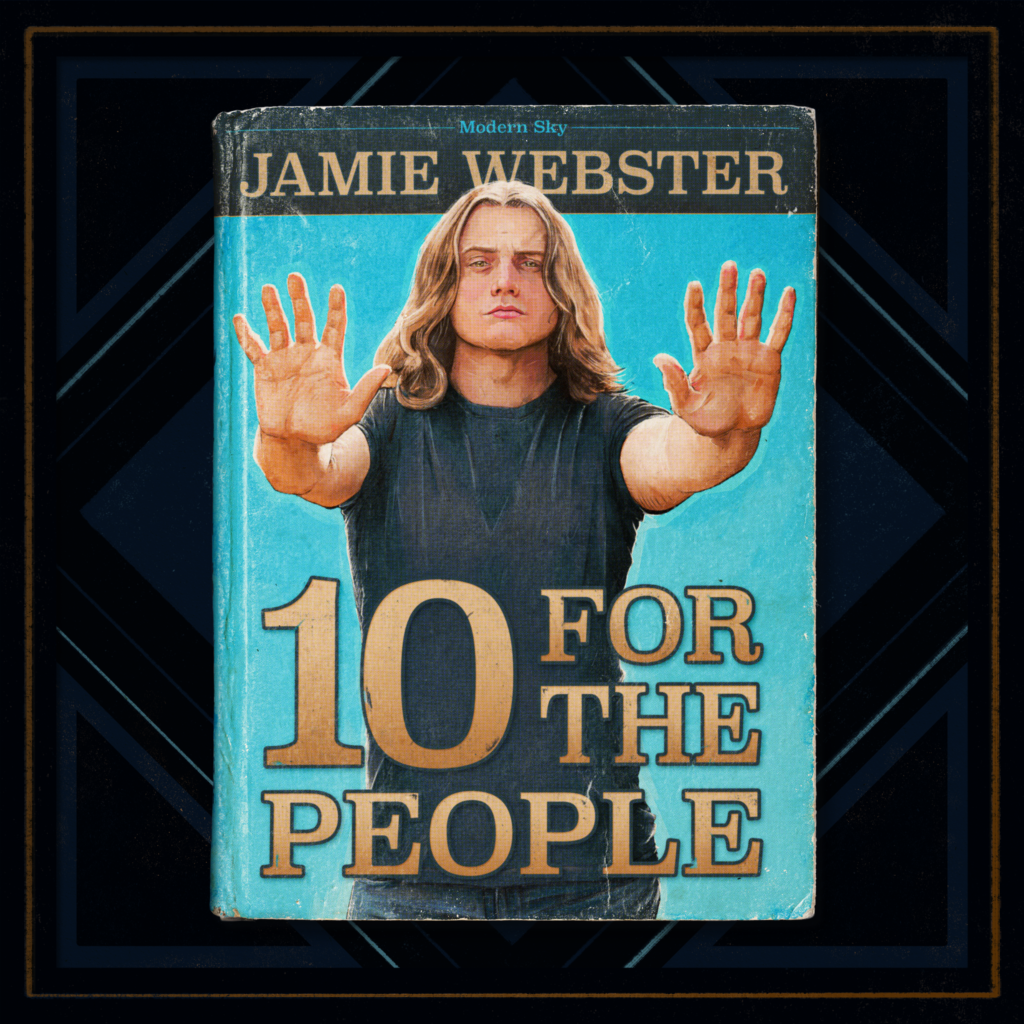THE PEOPLE’S POET JAMIE WEBSTER RETURNS TO RETAIN HIS TITLE WITH HIS BRAND NEW ALBUM ’10 FOR THE PEOPLE’

BY MORGAN HERMISTON
When the punk era first imploded into music, particularly in the British scene, there was shock over what were once taboo or rebellious anti-establishment lyrics. In 2024, we are still seeing these lyrics, but with noticeably less outrage. The conversations have become static yet Liverpool’s Jamie Webster has produced an album of social commentary that, in my opinion, could top all others. Perhaps the angry tone of the Sex Pistols wasn’t enough, and the accent of Gerry Cinnamon too strong to get their messages across to the intended recipients, but Webster takes this opportunity to produce songs that will get his messages through to anyone who stops to listen.
With “10 For The People” generally reflecting on life and hardships, Jamie Webster has produced a record of generational observation. The album begins with a reflection of his own life with ‘Better Day’, an anthem that perfectly summarises the album before it’s even started. He talks of his own successes and how they were “more than I was hoping for” but delves into a motivational message of standing “up for the people”. In the perfect intro to his album, the bright and airy melody gives hope in a world where there doesn’t seem to be any.

Continuing this conversation, second track ‘Voice Of The Voiceless’ becomes an umbrella concept, encompassing every song on the 11-track record. Webster makes “noise for the noiseless” as he brings up topics from the innocence and purity of love to how dire the world seems to be. This second track is the most streamed single from this newest album and it’s obvious why. The captivating and clever construction links in with the first track to create an accepting atmosphere of being there for those with no support.
Tracks like ‘Looking Good’ and ‘Lovers In The Supermarket‘ appear to be more simple songs. However, the common theme in Webster’s work is the openness and versatility of his words. ‘Looking Good’ emphasises the importance of accepting yourself, “you’ve got your own world to sort”. It talks of individual style and taste but Webster sings “as long as you are smiling”, “you’re looking pretty good to me”. The simplicity in the wording holds impact and carries on into ‘Lovers In The Supermarket’. This tune paints a perfect picture of the purity of love, especially in older relationships. Throughout the album, there is an observation into different generations but in this track, the conversational concept speaks of the simple things that we often forget about, “she smiled, I love you too”.
Webster’s storytelling style carries on with ‘The Boy (Chapter 1)’ and ‘The Girl (Chapter 2)’, two songs where he personifies concepts and turns them into something more of us can relate to. He does this in a similar way to fellow Scouse act, The Beatles in songs like ‘Get Back’ and ‘Eleanor Rigby’. They are heartfelt tales of hardship that primarily focus on the weight placed on ‘The Boy’ and ‘The Girl’ like “talking right, walking right” and “lying there wishing that his world could change”. Pressures are spoken about in another single, ‘Sing Your Tears’, where he encourages the notion of speaking up about how we feel and that we should “sing when the times are hard”.

With a goldmine of lyrics to explore, Webster’s lively lyricism is something to admire. He personifies concepts in a way few people can. Acts like Gerry Cinnamon, Amy Macdonald, and Billy Bragg have all ventured into writing like this, which Webster seems to have closely drawn from with his work. The latter of these inspirations features on the album in one of the singles, ‘Fickle Fran’, a reminder that while everything can seem bright, not everyone shares the same feeling.
‘Dolly Bird’, ‘Something To Eat’ and ‘How Do You Sleep At Night’ contain Webster’s political and passionate portrayals of prioritising necessities. He emphasises the distinction in classes and the importance of being grateful for what we’ve got where others have nothing. In haunting renditions of real life, he pushes that if you are “lying wealthy on your sunbed” and living wrapped up in your own comfort, you shouldn’t be making decisions on “half of the nation” who “are working two occupations” and those that have “got no hope in sight”.
The album ends on a politically poignant note. The single ‘How Do You Sleep At Night’ is Webster’s message to establishments where he states “don’t tell me everything’s alright”. With lyrics like “a death toll in the millions” and “Mr, tell me how do you sleep at night” he asks questions most of us are asking. It is a song that hopefully won’t be as topical in a few years, but let’s be honest, that doesn’t seem likely. He places the blame of innocent people suffering on politicians and establishments, “it’s thanks to you they’re labelled refugees”. The simplicity of the melody is bound to be easy enough for those making drastic decisions to wrap their heads around.
“10 For The People” is an album that motivates, reminisces and incites thought. In this incredibly well written record, Jamie Webster has produced songs that many of us will return to for supportive and reflective notions whenever they’re needed. It is 100% “For The People” and one I will forever enjoy listening to.



